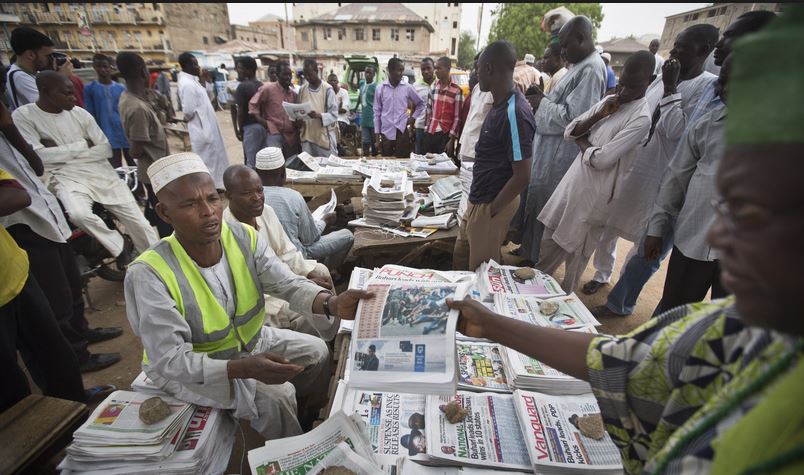The Guardian reports that President Muhammadu Buhari, late Sunday, met with his Ghanaian counterpart, Nana Akufo-Addo, in Abuja on the way out of the diplomatic row between both nations on account of the closure of Nigerian businesses over fresh startup capital legislation in that West African country.
The disclosure, which was made by the Personal Assistant to the President on New Media, Bashir Ahmad, on his Twitter handle, read: “President @MBuhari receives Ghanaian President H.E. @NAkufoAddo tonight (11:36p.m. on Sunday) in his official residence at the State House, Abuja.”
He, however, did not shed light on the closed-door parley, but informed sources, yesterday, said the meeting was on resolving the crisis.
In recent months, relations between Nigeria and Ghana have strained, beginning with the demolition of diplomatic structures belonging to the most populous black nation in Accra by supposed non-state actors. This was followed by the shutting of enterprises owned by Nigerians amid alleged harassments.
ThisDay says that the Group Managing Director of the Nigerian National Petroleum Corporation (NNPC), Mallam Mele Kyari, has said that the benefits of the fuel subsidy regime were enjoyed by members of a market cabal engaged in fuel marketing and not the masses that it was targeted at.
The corporation has also reaffirmed its commitment to the pursuit of a 35 per cent women inclusion in its workforce.
This is coming as it was revealed that the federal government spent a whopping N8.942 trillion in subsidising petroleum products between 2006 and 2015, according to figures from the Petroleum Product Pricing and Regulatory Agency (PPPRA), indicated yesterday.
Speaking during a Hausa programme on a radio station in Kaduna, Kyari said subsidy was removed because it was characterised by fraudulent activities.
He explained that fuel subsidy was not beneficial to the masses who are the original target beneficiaries, therefore, the federal government removed it with a plan to reinvest on projects that will have a direct impact on the masses.
The Punch reports that amid the coronavirus-induced sharp drop in its revenues, the Federal Government reduced its spending on oil and gas assets being developed through joint ventures with private firms by 61.83 per cent in July.
The Nigerian National Petroleum Corporation, which represents the Federal Government in the JVs, has an obligation to make cash call payment for the development of the assets. The NNPC’s cash call payment fell to $94.84m (N34.14bn) in July from $248.48m (N89.45bn) in the previous month, the corporation’s latest data showed.
The nation’s oil and gas production structure is majorly split between the JV (onshore and in shallow waters) and the Production Sharing Contracts in deepwater offshore.
Under the JV arrangement, both the NNPC and the private firms contribute to the funding of operations in the proportion of their equity holdings and generally receive the produced crude oil in the same ratio.
The newspaper says that the Federal Government spent N8.94tn on petrol subsidy between 2006 and 2015, figures released by the Petroleum Products Pricing Regulatory Agency on Monday showed.
Data from the PPPRA showed that during the 10-year period, the government consistently spent billions of naira subsidising Premium Motor Spirit, popularly called petrol. It said that in 2006, 2007, 2008, 2009 and 2010, the government spent N257.36bn, N271.51bn, N630.57bn, N469.31bn and N667.08bn respectively.
Also in 2011, 2012, 2013, 2014 and 2015, the government paid N2.104tn, N1.354tn, N1.315tn, N1.217tn and N653.51bn respectively on petrol subsidy. The PPPRA had in March commenced the deregulation of the downstream oil sector in a bid to halt the continued payment of subsidy. Before March, the Nigerian National Petroleum Corporation, the sole importer of petrol into Nigeria, had been recording under-recoveries as a result of its subsidy spendings on petrol.
Last week, The PUNCH reported that the PPPRA gazetted a market-based pricing regime for petrol in its bid to further boost the deregulation of the downstream oil and gas sector. Spokesperson of the agency, Kimchi Apollo, told our correspondent that with the new gazette, oil marketers were now empowered to fix petrol price in accordance with the market realities.
The Nation reports that the Nigerian Communications Commission (NCC) has started a cost-based study to set the new pricing regime for mobile international termination rate (ITR) for inbound international voice calls.
The ITR is the rate paid to local operators by international operators to terminate calls in the country. Director, Public Affairs Dr. Ikechukwu Adinde, on Monday said as part of the process for the rate determination, the Commission has organised a virtual stakeholder engagement forum with relevant industry stakeholders to intimate them with the ongoing cost-based study and the need to cooperate with Messrs Payday Advance and Support Services Limited, the consultants engaged to carry out the study.
Addressing the stakeholders in Abuja, the Executive Vice Chairman of NCC, Prof. Umar Danbatta, said the study had become imperative following the various implementation constraints that arose from contending industry and market dynamics that met previous efforts at finding an optimum price for the termination of international voice services in the country.
Danbatta, who was represented by NCC’s Executive Commissioner, Stakeholder Management, Adeleke Adewolu, the said through the new ITR pricing, the Commission would balance the competing objectives of economic efficiency and allowing operators the latitude to generate reasonable revenue.
|
|


